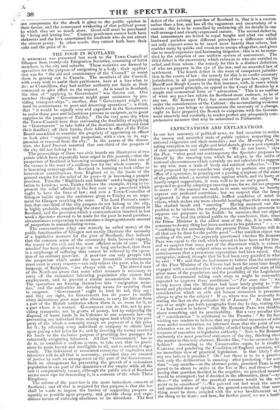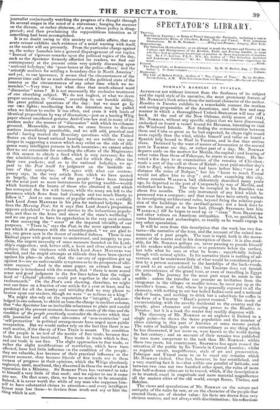EXPECTATIONS AND EXPLANATIONS.
In our last summary of political news, we had occasion to notice the uneasy and unsettled state of public opinion respecting the national exigencies and their remedies ; and the Morning Post, in taking exception to our slight and brief sketch, gives a new example of that uneasiness and unsettlement. "We do not know," says the Post, " what good our contemporary the Spectator proposes to himself by the sneering tone which he adopts, in the midst of national circumstances which certainly are not calculated to suggest to any wise man a train of lively and satirical reflection."—The good proposed by our remarks was simply to perform one proper office of a spectator, in pointing out a passing symptom of the state of the public mind ; a morbid state, against which, and its hasty or hastily-urged suggestions, it were well to be on one's guard. We proposed no good by adopting a sneering tone, for we did not propose to sneer : if the manner was such as to seem sneering, we hereby express our profound contrition ; but we suspect that the fancy originated in that uncomfortable, baffled condition of mind in others, which makes any more cheerful bearing than their own seem like studied insult and " sneerinF." Having assumed our dis- position to be vicious, the worthy journalist forthwith proceeds to suppose our purposes to be foolish : he surmises that our object may be, "to lead the critical public to the conclusion, that, since the Prime Minister is the ablest man of the day, it is mere idle nonsense to do any thing but leave matters to his guidance" - - - - " confiding in the certainty that the present Prime Minister will dc all that can be done for the public good."—Our manifest object was nothing of the sort : 'we expressly questioned whether Sir Romme PEEL was equal to the task which seemed to have been set for him and we suspect that some part of the discontent which is evinced at our allusion to the subject arises as much as any thing from the consciousness that a premature expectation had been raised. Oui antagonist, indeed, thought that he had been very guarded in what he said : " We said that we had reason to believe that the attentior of the First Minister of the Crown had been for some time deepli engaged with a consideration of the moral and physical state of thi great mass of the population, and the possibility of the Legislature and the Government taking such steps as might be reasonabl: expected to improve those conditions. —"For some time" ! wa; it only meant that the Minister had been lately giving to " tie moral and physical state of the great mass of the population" tha consideration which an able and honest statesman is presume( always to give to the subject.? If so, where was the necessity fo stating the fact on the particular 3d of January ? At that rate any of us might put forth paragraphs from day to day, stating tha " we had reason to believe" that Sir ROBERT PEEL was thinkini about something and its practicability. But a very peculiar kin' of " consideration " is attributed to the Premier : " So far fror wishing our readers to believe that any practical measures of relic were under consideration, we informed them that the point of con sideration was as to the possibility of relief being afforded by an measure of executive or legislative authority." Now is Sir Romer eminently the most practical statesman of the day, thinking abou the matter in this very abstract, Hamlet-like, "to-be-or-not-to-be fashion ? According to the Conservative organ, he is rivallin, CARLYLE and pondering the ,Condition-of-England question, wit no immediate view of practical legislation. Is that likely ? doe any one believe it possible ? Oh ! but there is to be a practice end, only the deliberation is amazing : after pondering " for son time "—say months—on the abstract point, practical PEEL is sup posed to be about to arrive at the Yes or No; and then—" Sup posing that question decided in the negative, no practical measur would be attempted ; but if decided in the affirmative, then "--11Y1 then—" the nature of the practical measure would be the no; point to be considered" !—We pointed out last week the uneas and unsettled state of opinion, the general conviction that sons thing must be done, coupled with the utter bewilderment as t the thing to be done ; and here, for further proof, we see a leadis
journalist conjecturally watching the progress of a thought through its several stages in the mind of a statesman ; banging for succour on the dictum, or rather dicturum, of a man whose policy is disap- proved; and then proclaiming the supposititious intention as if something had been accomplished.
It is no doubt owing to this anxiety on public affairs, that our acute censor exhibits such evidence of a mind warring with itself, as the reader will see presently. From the particular charge against us, the writer launches into a general disparagement of our topics. " Instead of vigorous remarks upon the political topics of the day, such as the Spectator formerly afforded its readers, we find our contemporary at the present crisis very quietly discussing upon national holydays,' the 'poor-boxes at the police-offices,' and the 'scientific motives for settling a boundary-line in North America' : and yet, to our ignorance, it seems that the circumstances of the present time call for as much discussion of the political state of the country as the circumstances of any other time which we re- member."—Very true ; but what does that much-abused word "discussion " mean ? It is not necessarily the exclusive treatment of one absorbing subject. We do not neglect, at what we deem proper occasions, to "discuss," according to our humble ability, the great political questions of the day : but we must go by our own lights ; recollecting how the attention may be palled when we labour to excite it too often, and cram it with loads of identical propositions by way of discussion,—just as a leading Whig paper almost smothered genuine Anti-Corn-law zeal in many of its readers under the masses of " discussion" with which its columns groaned. Meanwhile, at intervals, we crave licence to discuss matters immediately practicable, and we will add, practical and useful : having treated the Boundary questions with the United States on their broad national bearings, we see neither vice nor danger in suggesting a reason which may enlist on the side of dili- gence many intelligent persons in both countries ; we cannot admit that we are censurable for seconding the efforts of the Magistrates at this season to obtain a fund which is very necessary for the due administration of their office, and for which they often tax their own pockets ; and as to the national holydays, we ap- peal to the Post itself for judgment on the laudable na- ture of that enterprise. We agree with what our contem- porary says, in the very article from which we have quoted so largely, that the mass of the people " have been treated for the most part as mere instruments for getting wealth—wealth which hardened the hearts of those who obtained it, and which has corrupted the few with luxury, while the many are left to the grossness which flows from bad example and too much liberty to follow it." And as one means of popular refinement, we cordially back Lord JOHN MANNERS in his plea for national holydays. So does the Morning Post; for it says that Lord Joust's proposition appears calculated " to do good service to the industrious popula- tion, and thus to the bone and sinew of the state's wellbeing": and we are proud to have its approbation in the very next column to that conveying the " sneer" at the imputed triviality of our purposes. " There is," says the Post, in the more agreeable man- ner which it alternates with the misanthropical, " we are glad to say, one green spot in the desert of crabbed dulness. There is one Radical paper with good sense to understand, and integrity to pro- claim, the urgent necessity of some measure founded on his Lord- ship's suggestion ; and, better still, a keen and close observer is of opinion that the virulence with which Lord Joust MANNERS was assailed, and the stupid attempts at ridicule that have been ejected against his plan—in short, that the cur-cry of opposition got up against it—are no unfavourable symptoms as to its prospects of ulti- mate success." And in the same paper, an extract from our columns is introduced with the remark, that " there is more sound sense and good judgment in the few lines below than the vulgar herd of Liberal' plodders could put together in the circle of a twelvemonth." On the Post's own showing, therefore, we might rest our fame on a fraction of one article for a year at least, and be pardoned for all the inanity and triviality that we may please to bestow upon our readers, though we were " as tedious as a king."
We might also rely on the reputation for "integrity," acknow- ledged in one column, to shield us from the charge in another column, that "the Spectator has an invincible reluctance to plain and candid speaking at the present moment, because the events of the time and the condition of the people practically contradict the theories which that able journalist and all other advocates of non-restriction' and ' self-protection ' in political arrangements have urged upon public acceptation. But we would rather rely on the fact that there is no such motive, if the theory of Free Trade is meant. The condition of the people is no test of the merits of free trade, because free trade has not been instituted. Free trade is trade which is free, and our trade is not free. The slight approaches to free trade, or rather the slight modifications of restriction, which have been effected, have had little influence on the condition of the people : they are valuable, less because of their practical influence at the present moment, than because friends of free trade see in them earnest of progress in their opinions, which the Whigs absolutely neglected, until, moribund, they discerned in them the seed of a new reputation for a Ministry. Sir ROBERT PEEL has ventured to take to himself a very little of that seed ; and we rejoice to see it come Into use. On that score, then, we have no motive to be uncandid. Indeed, it is never worth the while of any man who supposes him- self to have substantial claims to attention—and every intelligent honest man has them—to deviate from truth and say or hint the thing which is not.



























 Previous page
Previous page